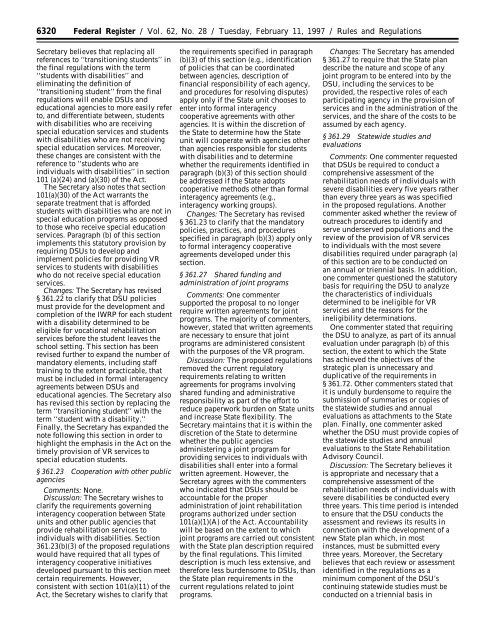federal register - U.S. Government Printing Office
federal register - U.S. Government Printing Office
federal register - U.S. Government Printing Office
Create successful ePaper yourself
Turn your PDF publications into a flip-book with our unique Google optimized e-Paper software.
6320 Federal Register / Vol. 62, No. 28 / Tuesday, February 11, 1997 / Rules and RegulationsSecretary believes that replacing allreferences to ‘‘transitioning students’’ inthe final regulations with the term‘‘students with disabilities’’ andeliminating the definition of‘‘transitioning student’’ from the finalregulations will enable DSUs andeducational agencies to more easily referto, and differentiate between, studentswith disabilities who are receivingspecial education services and studentswith disabilities who are not receivingspecial education services. Moreover,these changes are consistent with thereference to ‘‘students who areindividuals with disabilities’’ in section101 (a)(24) and (a)(30) of the Act.The Secretary also notes that section101(a)(30) of the Act warrants theseparate treatment that is affordedstudents with disabilities who are not inspecial education programs as opposedto those who receive special educationservices. Paragraph (b) of this sectionimplements this statutory provision byrequiring DSUs to develop andimplement policies for providing VRservices to students with disabilitieswho do not receive special educationservices.Changes: The Secretary has revised§ 361.22 to clarify that DSU policiesmust provide for the development andcompletion of the IWRP for each studentwith a disability determined to beeligible for vocational rehabilitationservices before the student leaves theschool setting. This section has beenrevised further to expand the number ofmandatory elements, including stafftraining to the extent practicable, thatmust be included in formal interagencyagreements between DSUs andeducational agencies. The Secretary alsohas revised this section by replacing theterm ‘‘transitioning student’’ with theterm ‘‘student with a disability.’’Finally, the Secretary has expanded thenote following this section in order tohighlight the emphasis in the Act on thetimely provision of VR services tospecial education students.§ 361.23 Cooperation with other publicagenciesComments: None.Discussion: The Secretary wishes toclarify the requirements governinginteragency cooperation between Stateunits and other public agencies thatprovide rehabilitation services toindividuals with disabilities. Section361.23(b)(3) of the proposed regulationswould have required that all types ofinteragency cooperative initiativesdeveloped pursuant to this section meetcertain requirements. However,consistent with section 101(a)(11) of theAct, the Secretary wishes to clarify thatthe requirements specified in paragraph(b)(3) of this section (e.g., identificationof policies that can be coordinatedbetween agencies, description offinancial responsibility of each agency,and procedures for resolving disputes)apply only if the State unit chooses toenter into formal interagencycooperative agreements with otheragencies. It is within the discretion ofthe State to determine how the Stateunit will cooperate with agencies otherthan agencies responsible for studentswith disabilities and to determinewhether the requirements identified inparagraph (b)(3) of this section shouldbe addressed if the State adoptscooperative methods other than formalinteragency agreements (e.g.,interagency working groups).Changes: The Secretary has revised§ 361.23 to clarify that the mandatorypolicies, practices, and proceduresspecified in paragraph (b)(3) apply onlyto formal interagency cooperativeagreements developed under thissection.§ 361.27 Shared funding andadministration of joint programsComments: One commentersupported the proposal to no longerrequire written agreements for jointprograms. The majority of commenters,however, stated that written agreementsare necessary to ensure that jointprograms are administered consistentwith the purposes of the VR program.Discussion: The proposed regulationsremoved the current regulatoryrequirements relating to writtenagreements for programs involvingshared funding and administrativeresponsibility as part of the effort toreduce paperwork burden on State unitsand increase State flexibility. TheSecretary maintains that it is within thediscretion of the State to determinewhether the public agenciesadministering a joint program forproviding services to individuals withdisabilities shall enter into a formalwritten agreement. However, theSecretary agrees with the commenterswho indicated that DSUs should beaccountable for the properadministration of joint rehabilitationprograms authorized under section101(a)(1)(A) of the Act. Accountabilitywill be based on the extent to whichjoint programs are carried out consistentwith the State plan description requiredby the final regulations. This limiteddescription is much less extensive, andtherefore less burdensome to DSUs, thanthe State plan requirements in thecurrent regulations related to jointprograms.Changes: The Secretary has amended§ 361.27 to require that the State plandescribe the nature and scope of anyjoint program to be entered into by theDSU, including the services to beprovided, the respective roles of eachparticipating agency in the provision ofservices and in the administration of theservices, and the share of the costs to beassumed by each agency.§ 361.29 Statewide studies andevaluationsComments: One commenter requestedthat DSUs be required to conduct acomprehensive assessment of therehabilitation needs of individuals withsevere disabilities every five years ratherthan every three years as was specifiedin the proposed regulations. Anothercommenter asked whether the review ofoutreach procedures to identify andserve underserved populations and thereview of the provision of VR servicesto individuals with the most severedisabilities required under paragraph (a)of this section are to be conducted onan annual or triennial basis. In addition,one commenter questioned the statutorybasis for requiring the DSU to analyzethe characteristics of individualsdetermined to be ineligible for VRservices and the reasons for theineligibility determinations.One commenter stated that requiringthe DSU to analyze, as part of its annualevaluation under paragraph (b) of thissection, the extent to which the Statehas achieved the objectives of thestrategic plan is unnecessary andduplicative of the requirements in§ 361.72. Other commenters stated thatit is unduly burdensome to require thesubmission of summaries or copies ofthe statewide studies and annualevaluations as attachments to the Stateplan. Finally, one commenter askedwhether the DSU must provide copies ofthe statewide studies and annualevaluations to the State RehabilitationAdvisory Council.Discussion: The Secretary believes itis appropriate and necessary that acomprehensive assessment of therehabilitation needs of individuals withsevere disabilities be conducted everythree years. This time period is intendedto ensure that the DSU conducts theassessment and reviews its results inconnection with the development of anew State plan which, in mostinstances, must be submitted everythree years. Moreover, the Secretarybelieves that each review or assessmentidentified in the regulations as aminimum component of the DSU’scontinuing statewide studies must beconducted on a triennial basis in


